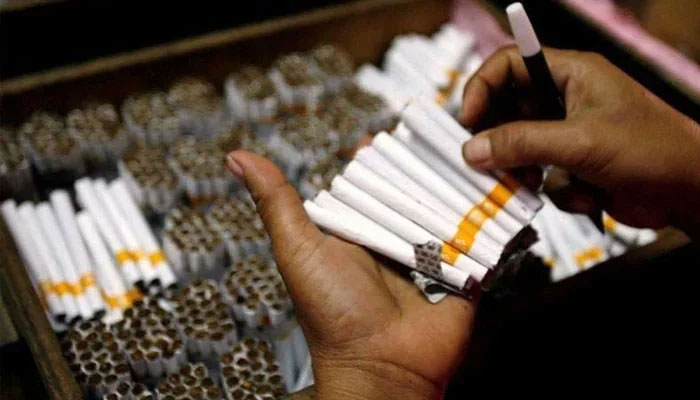Rs120 billion profit boost for tobacco industry in Finance Bill 2024-2025 criticised
Islamabad:The recent deliberations on the Finance Bill for the fiscal year 2024-2025 by the Finance Standing Committee have sparked controversy with significant implications for public health and fiscal policy. The bill introduces a startling Rs120 billion profit boost for the tobacco industry by raising the cut-off price for low-tier tobacco brands from Rs125 to Rs177. This move is projected to enhance profitability within the tobacco sector but has drawn sharp criticism for neglecting potential revenue streams crucial for healthcare and public welfare.
Renowned tobacco control activist Malik Imran Ahmed expressed dismay, stating, “The decision to bolster profits for the tobacco industry through increase in tax slabs not only undermines public health efforts but also squanders a critical opportunity to alleviate the economic burden on citizens.” Arooj Rajput, Focal Person of the Tobacco Control Campaign at Human Development Foundation (HDF), echoed these concerns, emphasising, “At a time when healthcare costs are soaring, the government's choice to forego potential revenue from tobacco taxes is deeply troubling. This revenue could have been pivotal in reducing sales taxes on essential drugs and easing the financial strain on staple food items and energy units, directly benefiting the public.”
Experts estimate that maintaining existing price slabs while increasing taxes could have generated substantial additional revenue. These funds could have played a crucial role in alleviating financial burdens on the public, potentially reducing costs on essential goods and redirecting resources towards healthcare, thereby improving public health outcomes. In contrast, recent amendments under the Finance Bill 2024-2025 have eliminated reduced sales tax rates on pharmaceutical products, now subjecting them to a standard rate of 18 percent. Furthermore, exemptions for goods supplied in bulk to charitable hospitals and those imported by non-profit hospital facilities have been rescinded, potentially hampering their ability to provide essential healthcare services effectively.
Malik Imran Ahmed underscored the missed opportunity, remarking, “By choosing to favour the tobacco industry over public health and welfare, the government is setting a dangerous precedent. The economic toll of tobacco-related illnesses already amounts to a staggering PKR 615 billion annually, underscoring the urgency of prioritizing healthcare funding over corporate interests."
The decision has raised alarms among healthcare advocates and the general public alike, who fear its long-term ramifications on public health and economic stability. As discussions on the Finance Bill progress, stakeholders continue to call for a reconsideration of policies that prioritize short-term industry gains over the broader public interest.
-
 Heidi Klum Gushes Over Diplo Collab 'Red Eye' Despite DJ Falling Asleep During Video
Heidi Klum Gushes Over Diplo Collab 'Red Eye' Despite DJ Falling Asleep During Video -
 Israel Behind Majority Of Journalist Deaths Worldwide, Watchdog Claims
Israel Behind Majority Of Journalist Deaths Worldwide, Watchdog Claims -
 'It Would Become A Circus' : Inside Jane's Turmoil For 'little Sister' Fergie Whose Hidden From The World
'It Would Become A Circus' : Inside Jane's Turmoil For 'little Sister' Fergie Whose Hidden From The World -
 Inside Cardi B's Real Feelings Related To Stefon Diggs Split Post One Year Of Romance
Inside Cardi B's Real Feelings Related To Stefon Diggs Split Post One Year Of Romance -
 Former Sri Lankan Intelligence Chief Arrested Over 2019 Easter Bombings
Former Sri Lankan Intelligence Chief Arrested Over 2019 Easter Bombings -
 Kristen Bell Shares One Rule For 'SAG' Awards Ceremony That She Will Ditch This Time: 'Happy And Fun'
Kristen Bell Shares One Rule For 'SAG' Awards Ceremony That She Will Ditch This Time: 'Happy And Fun' -
 Woman Suing Meta Platforms, YouTube Over Social Media Addiction Sticks To Claims After Trial
Woman Suing Meta Platforms, YouTube Over Social Media Addiction Sticks To Claims After Trial -
 Shakira Applauded For 'gracious' Behaviour By Fans As She Blends Work With Family Downtime
Shakira Applauded For 'gracious' Behaviour By Fans As She Blends Work With Family Downtime -
 Prince William Hits The Roof With The Andrew Saga Bleeding Into Earthshot
Prince William Hits The Roof With The Andrew Saga Bleeding Into Earthshot -
 Mexico’s President Considers Legal Action Over Elon Musk Cartel Remark
Mexico’s President Considers Legal Action Over Elon Musk Cartel Remark -
 HBO Gives Major Update About 'Industry' Season Five And Show's End
HBO Gives Major Update About 'Industry' Season Five And Show's End -
 Donnie Wahlberg Responds To 'Boston Blue' Backlash: 'Nobody Was More Disappointed Than Me'
Donnie Wahlberg Responds To 'Boston Blue' Backlash: 'Nobody Was More Disappointed Than Me' -
 Jennifer Garner Gets Emotional Over Humble Career Start: 'It Makes Me Want To Cry'
Jennifer Garner Gets Emotional Over Humble Career Start: 'It Makes Me Want To Cry' -
 Princess Beatrice Told An Acquaintance That She ‘likes’ Jeffrey Epstein: Grim Verdict Drops
Princess Beatrice Told An Acquaintance That She ‘likes’ Jeffrey Epstein: Grim Verdict Drops -
 Late Katherine Short's Neighbours Give Insights Into Her 'peace Loving' Personality Post Suicide
Late Katherine Short's Neighbours Give Insights Into Her 'peace Loving' Personality Post Suicide -
 Fresh Details Of King Charles, Queen Camilla's US Visit Emerge Amid Andrew Investigation
Fresh Details Of King Charles, Queen Camilla's US Visit Emerge Amid Andrew Investigation




